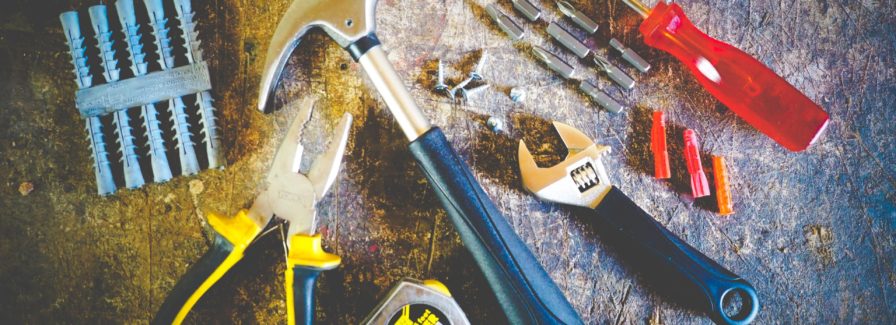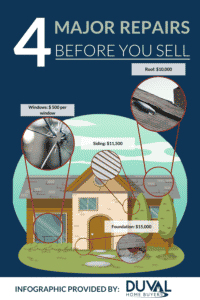
Posted on August 1, 2022 by Duval Home Buyers in Uncategorized
Should I Repair My Home Before Selling?
Did you know most homes are in need of some major repair? Did you also know that many of these repairs are required by lenders before they will underwrite a mortgage? But what exactly does that mean for you as a seller? Should you make repairs before you sell your home? Do you need to?
In most cases, the answer is yes. You should and may need to make repairs before you can sell your house. But don’t break out the sledgehammers just yet. Not everything needs to be fixed-up, and there are ways to sell without making repairs. In this article we will explore the costs and benefits of making repairs before selling so you can make sure you sell well when the time comes.
Items that need to be repaired
Most conventional loan products, the types of loans that most homebuyers obtain when purchasing a house, have a requirement that a home be “safe, sound, and structurally secure”.
This focuses on a few key areas: the roof, the subflooring, the electrical, the plumbing, and the general condition of the exterior. A leaky roof, broken windows, wood rot, or floor settling can quickly kill a deal, and can put your home sale in jeopardy.
Items that can optionally be repaired
Additional repairs, while not required, can add thousands of dollars in value and can help find buyers when you list your home. Bathroom remodeling projects and kitchen remodels are two great examples of repairs that homeowners often make to improve the value of their home, while making them more appealing on the open market.
Where to start making structural repairs
Most sellers don’t have an unlimited budget. After all, you are selling your home in the hopes of making money, not spending more of it. So where should you start?
-
Roof
One of the first places an inspector will look is the roof. They will consider the age and the overall condition of the roof and will make a professional judgment on its safety and lifespan. A roof with visible holes or a known leak won’t pass and will need to be patched, or more often replaced. Additionally, roofs older than 15 years can be automatically denied coverage by insurers, and some in Florida are unwilling to insure a roof older than 10 years. The cost of a roof installation all depends on your roof materials, the type of roof, and the season.
2.Foundation
Isaac Newton taught us that an object in motion remains in motion. This applies to our homes as well. Despite outward appearances the ground beneath our homes is always in motion. Most newer homes use types of foundational slabs designed to counteract this movement, but some older homes weren’t built to the same code. Over time erosion and moisture weakens the foundation, which can result in a sloping house, cracks in the walls, and even the complete collapse of a structure. A lender will be hesitant to loan on any home that shows visible signs of foundational damage or sinking often called “settling”.
3. Siding
The exterior appearance of the house makes a big difference to prospective buyers, but it’s also a warning sign to lenders and insurers. Warm and humid climates found in places such as Florida are breeding grounds for mold and other types of organisms which can rot and eventually destroy wood siding, supports, and even subfloors. Typically these organisms called (WDO) or wood destroying organisms are easily identified by looking at the exterior siding. Spots where the wood is rotting, falling away, or exposed under paint are of particular note.
4. Windows
Windows do more than let us look outside. They are key to security, insulation, climate control, and preventing water intrusion. Windows that are old, fogged, cracked, or downright broken are an immediate red flag for lenders and buyers alike.
How much do structural repairs cost?
Average repair costs depend on a number of factors such as the square footage of the house, materials, and the location. For example a roof replacement cost in Jacksonville may not match a roof replacement cost in Miami. Below are some common ranges based on pricing in Jacksonville, FL.
-
Roof Replacement Cost – $10,000 – 25,000
-
Foundation Repair Cost – $15,000 – $30,000
-
Siding Replacement Cost – $10,000 – $30,000
-
Window Replacement Cost – $300 – $500 per window
Where to start making non-structural repairs
Home improvement isn’t always a path to a higher price for a home on the market. Many repairs and upgrades don’t fully reflect on the sales price, and can end up costing a seller more than they make on the return.
-
Kitchen Remodeling
Homeowners spend a lot of time in their kitchens. A dated kitchen, or one with poor function is an instant turn-off. Adding features such as shaker cabinets, new appliances, or updated countertops can entice a buyer and make any home look like a luxury buy.
2. Bathroom renovation
A master bathroom can serve many purposes from a dressing room to a place to relax in a bath after a long day. A guest bathroom often reflects on the homeowner whenever visitors come. Both spaces benefit from a remodel.
3. Flooring
Old carpet, exposed concrete, and scuffed flooring are an instant turn-off to potential buyers. Bad floors can make a palace look like a dump. Upgrading to hardwood floors, LVP, or luxury carpet can make a world of difference.
How to sell without making any repairs
For some homeowners the cost of repairing a home before selling is too great, or there simply isn’t enough time to make the needed repairs. For sellers in these situations, there is an alternative. Selling to a real estate investor.
Reputable real estate investors such as Duval Home Buyers purchase homes as-is, meaning their current condition. When you sell your house as-is, you get to skip all of the repairs, cosmetic and structural, and can even leave unwanted possessions.
Regardless of your decision, ensure you weigh the costs, potential returns, and alternatives before committing to a selling plan!

